Best drumsticks 2025: wooden and synthetic sticks for beginner and pro drummers
Our experts help you choose the right drumsticks for your budget and drumming style
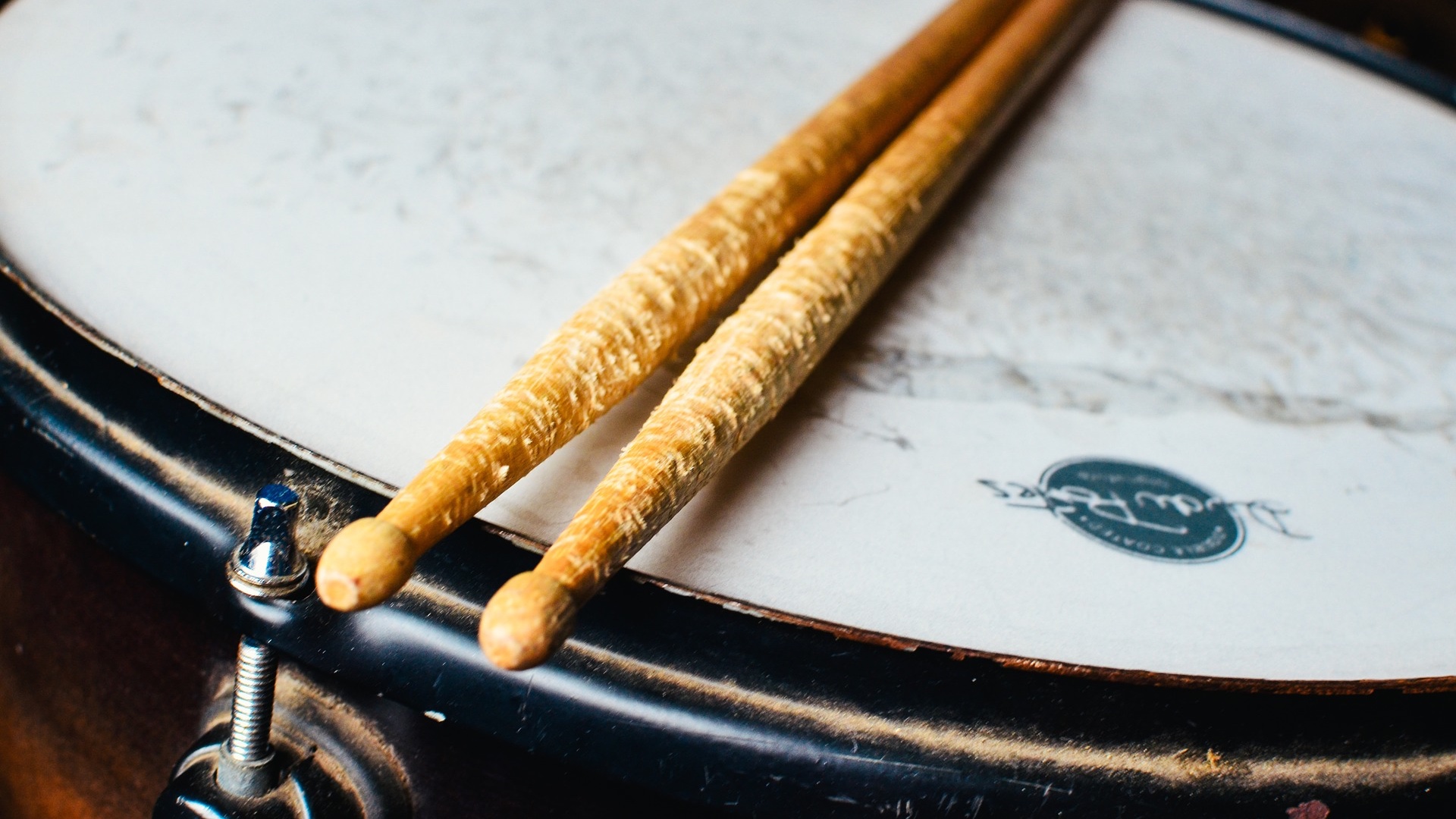
So, you've got your drum kit and you've chosen your ideal cymbals. Now you need the next link in the percussive chain - drumsticks. They're one of the most important tools in a drummer’s arsenal - the main point of contact between your hands and your gear - and they have a real impact on the way you play. Choosing sticks might seem like an arbitrary choice, but there really is a science to it, hence why we’ve created this guide to the best drumsticks available today.
If you've got the right drumstick in your hand, it should feel like an extension of your arm, so it’s important to choose carefully. If you're not sure where to start, fear not; the drumsticks in this guide include options for every style and budget, and we've added some handy buying advice further down the page to help you in your search.
The best model for you will be determined by a number of factors: the genre of music you play, the hardness with which you hit your gear and your overall budget will ultimately dictate which drumstick is right for you.
Nearly all drumstick brands – including the ‘big five’ of Vic Firth, Vater, Zildjian, Regal Tip and Promark – offer a similar range of standard models, which are great starting points. Most will agree, for example, that a well made 5A model is the best drumstick for rock.
The good news is that drumsticks aren't that expensive, unless you go for some of the more exotic synthetic sticks (which we also cover here), so you can reasonably and affordably invest in a few pairs to experiment.

Chris has been a drummer for 20+ years and has worked in the music gear industry for 19 years, including 7 of those as Editor of the UK's best-selling drum magazine, Rhythm. Over the years Chris has been hands-on with (and broken) hundreds of pairs of sticks, from classic styles and signature sticks, to synthetic models and even glow in the dark pairs.
Best drumsticks: Product guide
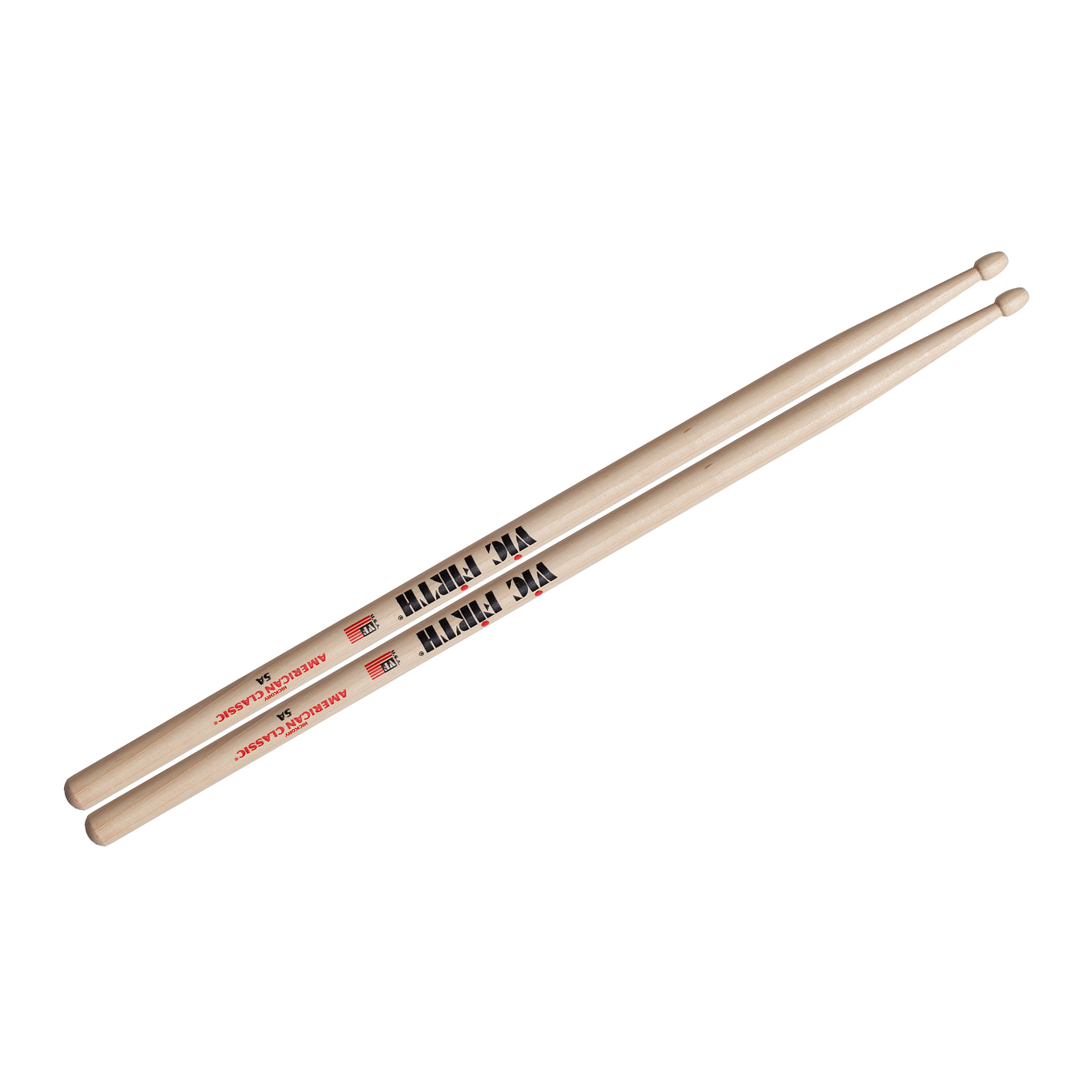
Material: Hickory
Length: 16”
Diameter: .565"
Tip: Tear drop
+ The rock drummer’s favourite
+ Vic Firth is known for stick quality
+ Unrivalled durability
- You may prefer a thicker stick
Playing rock music requires drummers to deliver plenty of power and attack. To achieve this, a solid starting point for any rock drummer is a 5A model stick, and in my opinion there’s no better example than Vic Firth’s American Classic 5A. These sticks are universally acknowledged as the best for rock, offering decent length, a medium taper for added strength and substantial diameter for the average drummer’s hands.
The tear drop tip delivers a potent combination of attack and warmth, helping everyone from softer players to hard hitters coax bombastic tones from their drums. Each stick is coated with a smooth lacquer too, which improves comfort and aids grip when your hands get sweaty during long periods of playing.
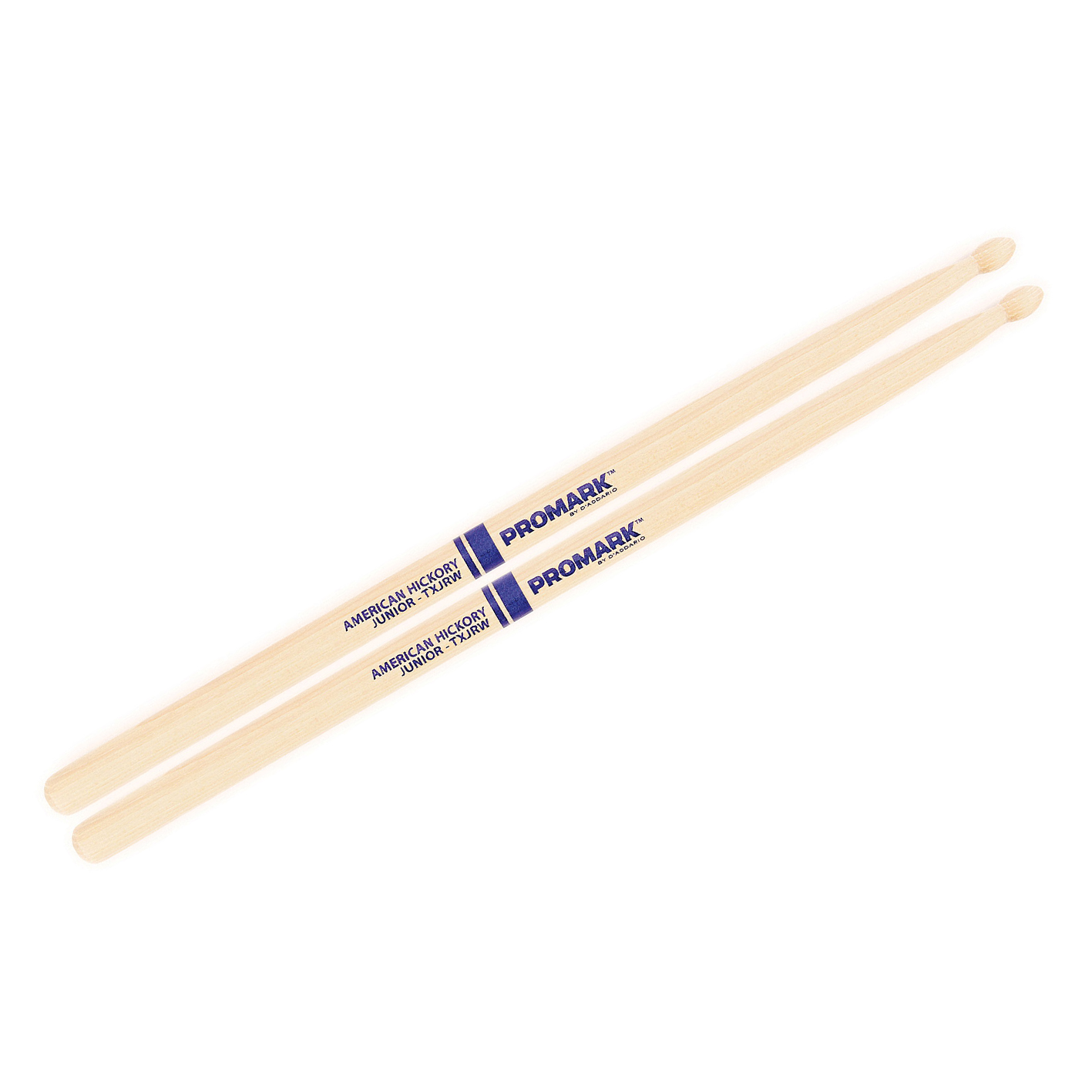
Material: Hickory
Length: 13”
Diameter: .531"
Tip: Oval
+ Shorter length for younger players
+ Durable hickory
+ Versatile oval tip
+ Ideal balance and rebound
- Not for grown-ups
When younger players start learning to play the drums it’s important that they use a drumstick that feels comfortable and manageable in their smaller hands. Full-size sticks can be too long and heavy, making them difficult to control. This can impact technique and, at worst, put off aspiring young drummers before they’ve had a chance to develop fundamental skills and start enjoying the drums.
At a pint-sized 13”, Promark’s Hickory Junior Wood Tip sticks are the best drumsticks for kids. They’re shorter than standard models, promoting a more comfortable, natural feel, while a medium taper helps deliver an even balance and rebound, meaning key techniques are picked up quickly. The oval tip is ideal for extracting a well-rounded, warm tone from the drums, no matter what style is being played.
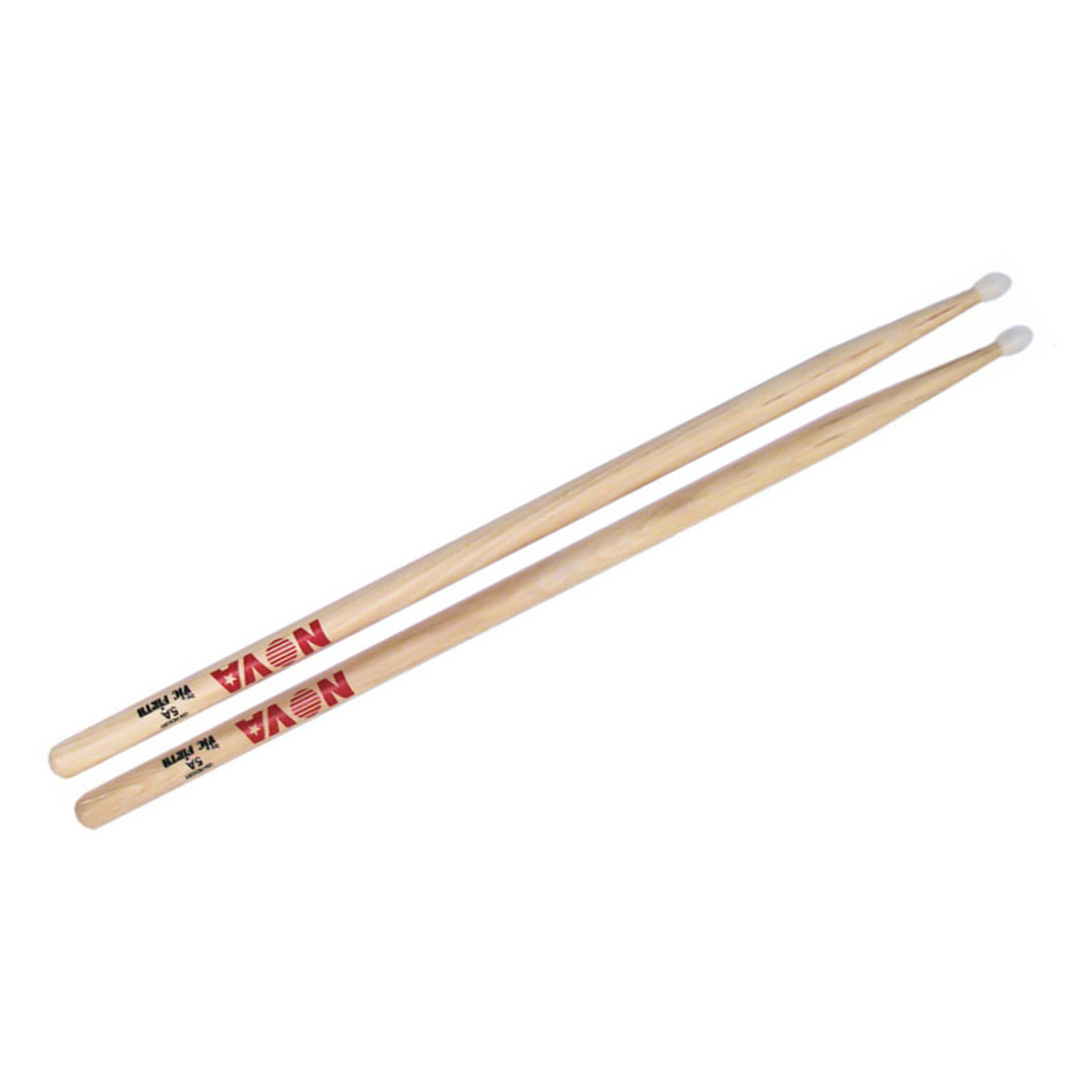
Material: Hickory
Length: 16”
Diameter: .565”
Tip: Tear drop
+ Much cheaper than a pair of regular sticks
+ Weight and pitch-matched
+ Versatile tear drop tip
- Honestly, they won't last as long as pricier sticks
Drumsticks might be one of the cheaper purchases a drummer will make, but if you play regularly and find you break a lot, the cost of replacements soon mounts up over time. Vic Firth’s Nova Series sticks are made from B-grade hickory, which helps reduce the cost to you, but that doesn't mean they're any less playable than premium sticks.
As with all Vic Firth models, Novas are weight and pitch-matched before they leave the factory, so each pair is guaranteed to feel balanced in your hands. At a fraction of the price, it’s even worth keeping a few pairs in your stick bag as back ups in case you run out of your first-choice sticks. In addition to the 5A model, Vic Firth also offer 5B and 7A Novas in a number of different colours.
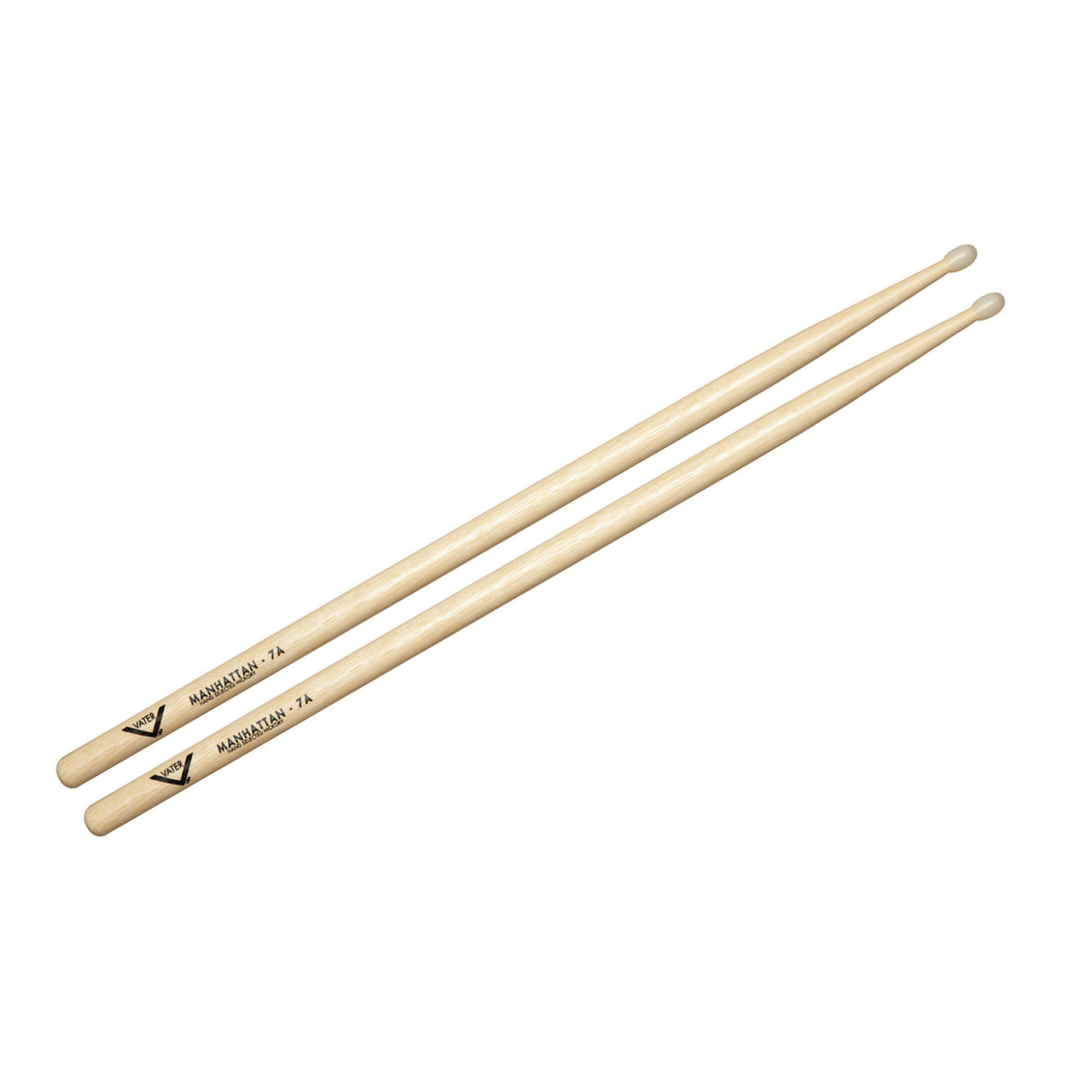
Material: Hickory
Length: 16”
Diameter: .540”
Tip: Round
+ Manageable size
+ Vater is renowned for quality
+ Smaller round tip for articulation
- Not for metalheads
If you’re a full-size human coming to the drums for the first time, it’s vital that you choose a beginner stick that gives you the best in feel, length, balance and power as a solid starting point. Then, as you develop, you can start exploring different models that suit your particular playing needs.
The 7A size doesn’t feel too big in the hands and is light enough to help you master key techniques. Vater’s Manhattan 7A model is the perfect example of this. It’s a premium quality stick that feels comfortable to play, with a small round tip for neat and defined cymbal playing. In fact, it’s such a versatile drumstick that you may never need to play another model. Vater offers this stick with wood or nylon tips.
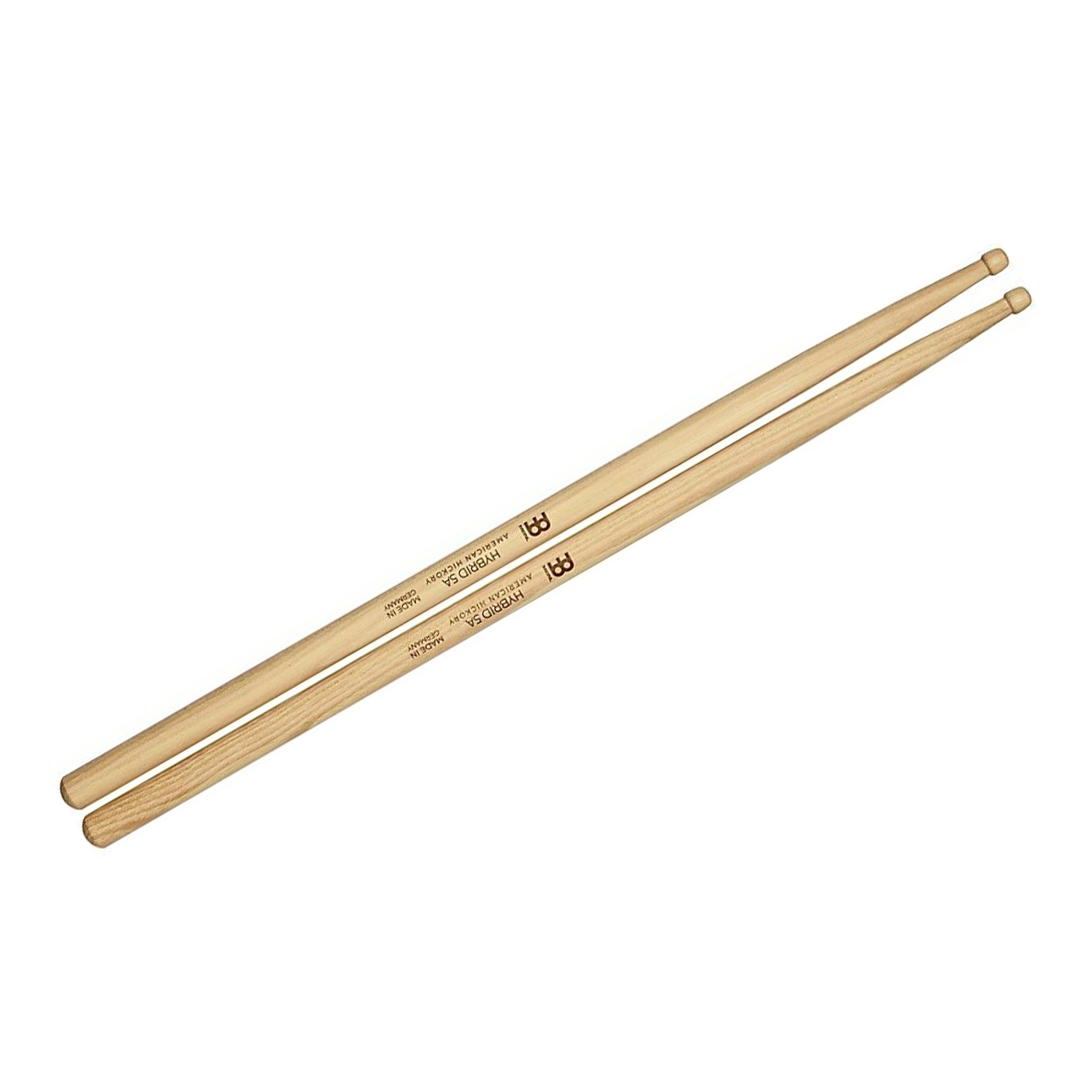
Material: Hickory
Length: 16.25”
Diameter: .565”
Tip: Hybrid
+ Designed for modern drummers
+ Unique Hybrid tip design
+ Enhanced reach
- Meinl is pretty new in the stick game
Modern drummers don’t really subscribe to one particular style anymore, playing everything from rock and pop to hip-hop and dance music, often within the same track. As such, those players need a drumstick that can handle the demands of diverse and dynamic drumming. Meinl’s Stick and Brush has become renowned for its forward-thinking approach to percussion products.
Their Hybrid model sticks – which includes 5A, 5B and 7A models – feature a unique Hybrid tip which starts life as an acorn shape, before being trimmed down to a barrel, enabling dark and smooth cymbal articulation, while the extended length and taper make these drumsticks ideal for playing fast fills and intricate grooves.
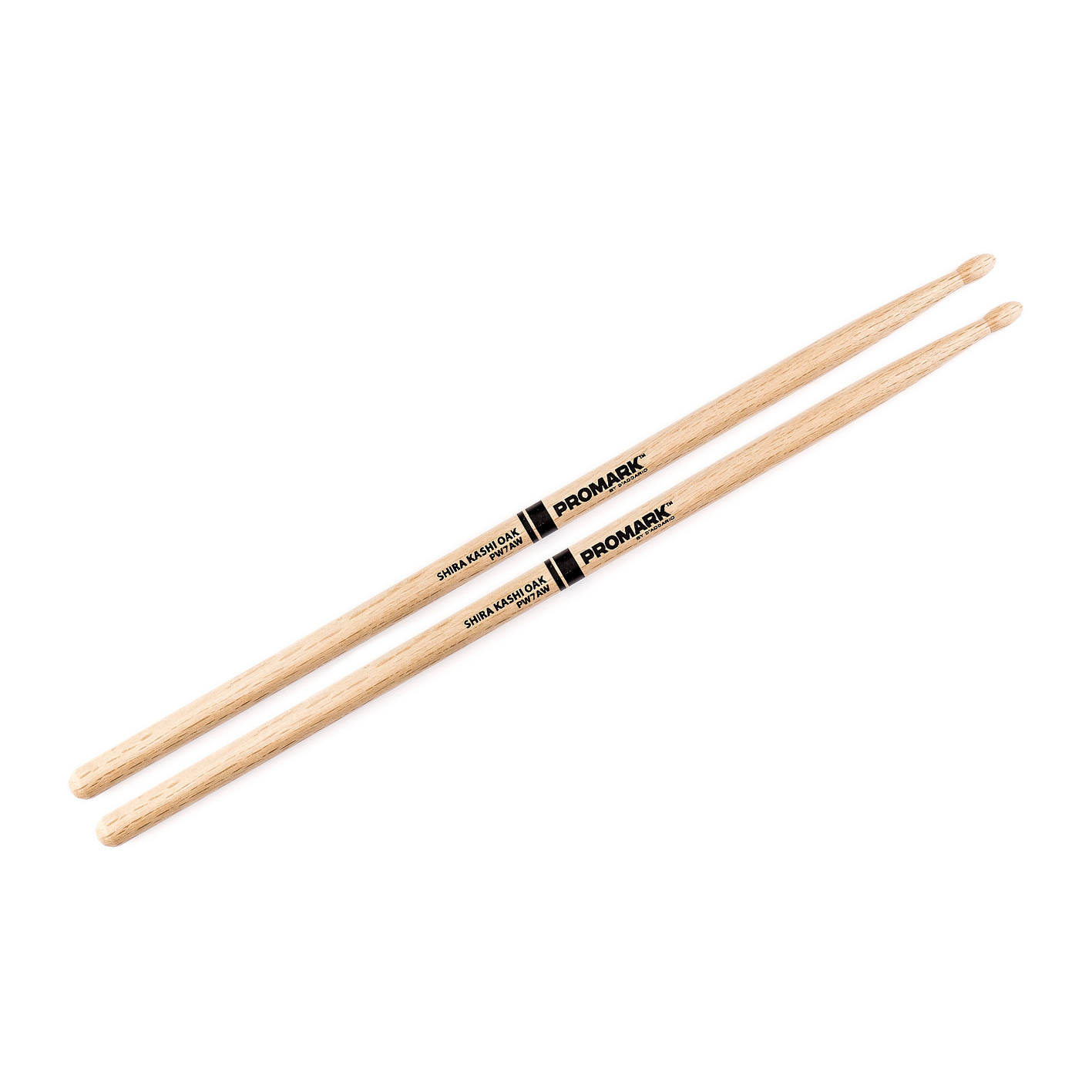
Material: Japanese oak
Length: 15 ⅜”
Diameter: .512”
Tip: Oval
+ Shorter length and lightweight
+ Japanese oak is dense and long-lasting
+ Oval tip helps produce darker tones
+ Great for cymbal articulation
- Pricier than hickory
Hickory is a common drumstick material, but there are plenty of alternatives worth considering. Shira Kashi Oak is dense and heavy – both great attributes for cymbal articulation – making it a great choice for jazzers. Japanese oak is also known for its durability, so these Promark sticks will last longer than hickory alternatives if treated with respect – we’re big fans of this considering the higher price for these sticks.
The shorter length and reduced diameter enables the player to inject greater nuance and dynamic into their drumming, whilst retaining a feeling of balance and control in the hands. The oval tip helps extract a darker, warmer tone from your drums.
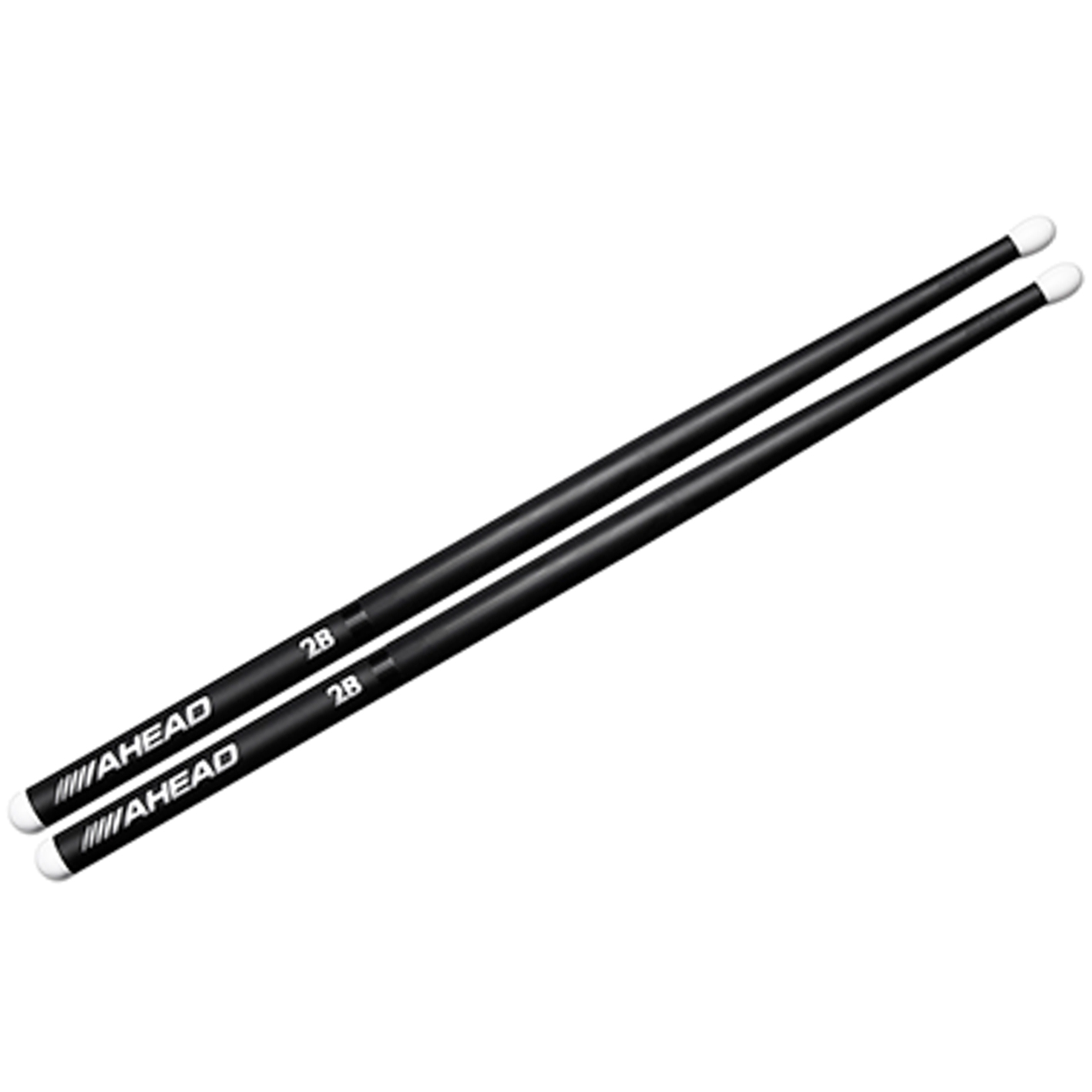
Material: Aluminium/nylon
Length: 16”
Diameter: .595”
Tip: Oval
+ Most durable sticks out there
+ Ideal for metallers
+ Replaceable sleeves and tips
+ Vibration control
- This durability costs
If you’re a metal drummer who is constantly breaking sticks, you may need to explore alternative materials to ensure there’s nothing in the way of you and your blastbeats. Ahead makes extremely durable drumsticks, built around an anodised aerospace-grade aluminium core, finished with durable polyurethane covers and ‘unbreakable’ nylon tips. Inside each stick you’ll find a vibration reduction system to help absorb the shock of heavier playing.
The 2B model feels substantial in the hands and is perfectly balanced to promote powerful playing, whilst being light enough to pull off faster beats. Ahead claims their sticks last up to 10 times longer than wooden drumsticks, which takes the sting out of the price tag.
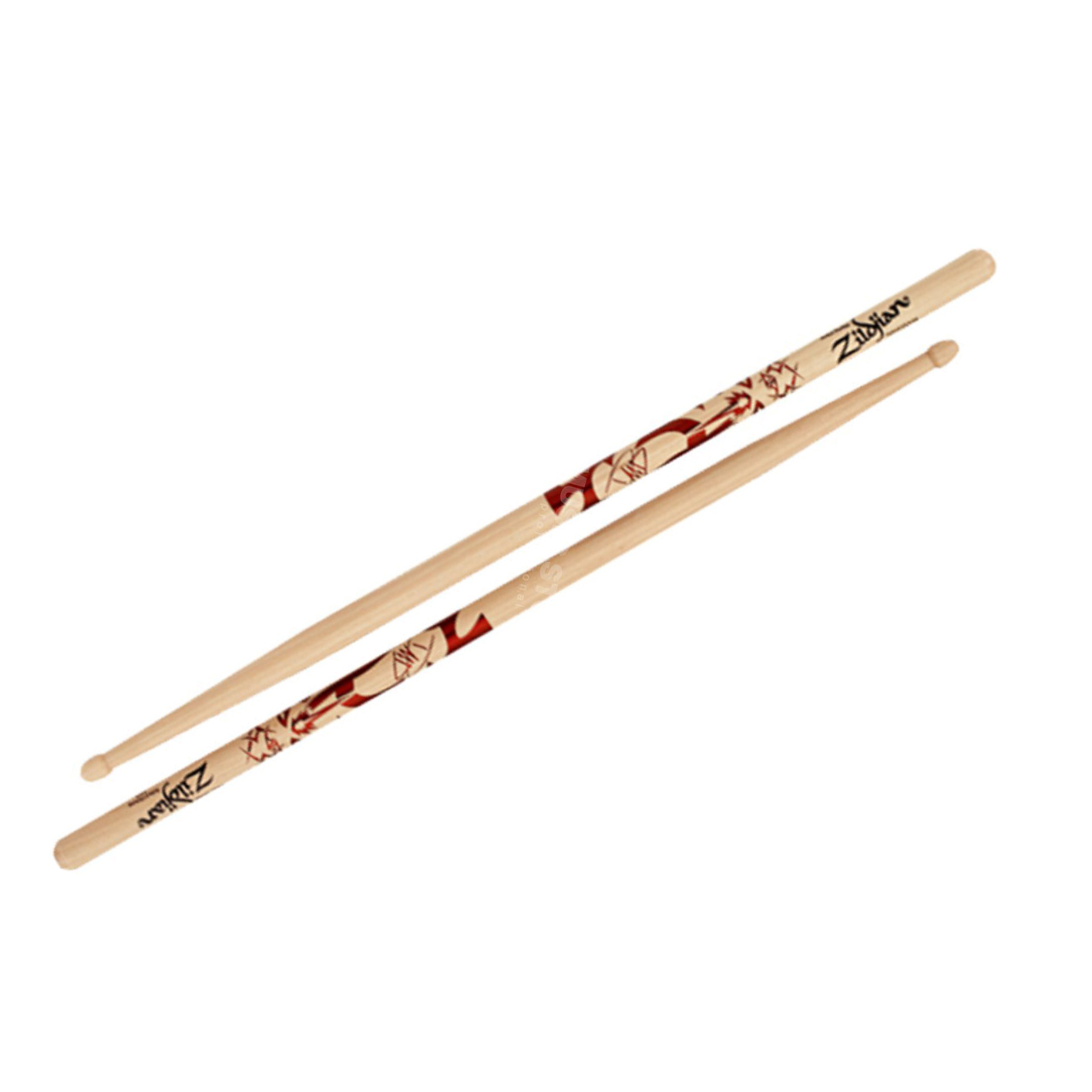
Material: Hickory
Length: Various
Diameter: Various
Tip: Various
+ Large range of models available
+ Designed directly with your favourite players
+ Options to suit your individual style
- You may not find a model for you
Cymbal giant Zildjian has a huge artist roster, which includes everyone from Dave Grohl and Ringo Starr, to Dennis Chambers, Travis Barker, Tre Cool and Josh Dun. Many of their artists also play Zildjian-branded sticks, which says a lot about the quality and diversity of the drumsticks they offer.
Delve deep into the Zildjian artist line-up and you’ll find multiple gauges, tip-types and colours to suit your individual tastes, visual style and spec needs. It’s worth trying out the stick of your favourite drummer first, but who knows, maybe you’ll discover the perfect stick bearing the name of a drummer you’d never even considered before? It's always worth trying multiple pairs.
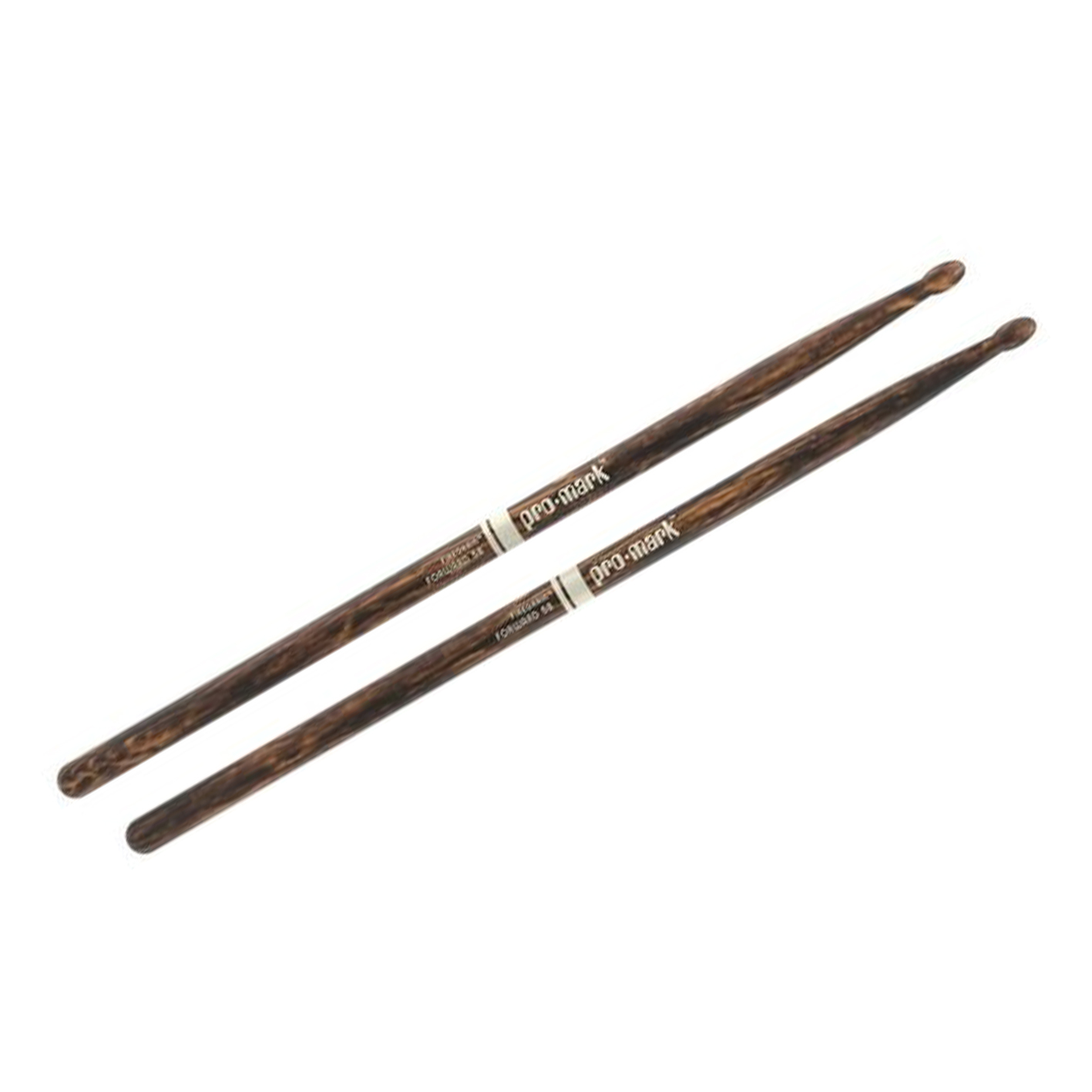
Material: Hickory
Length: 16”
Diameter: .590"
Tip: Oval
+ Heat treated for durability
+ Mainstream sizes available
+ The burned finish looks great
- Less flex than regular sticks
Stick durability is an issue that has been addressed by almost every drumstick manufacturer on the planet, all to varying degrees of success. If breaking sticks is a regular occurrence behind your drum kit, but the idea of going down the fully synthetic route is a complete turn off, Promark’s Firegrain sticks could be the most convincing solution yet.
These unique-looking drumsticks have been treated to a special heat-tempering process that hardens the hickory, in turn boosting strength and durability. But this is the key point - this is all achieved without impacting the feel and tone of the stick. It’s a solution that we've found just works, and while the price tag is slightly higher than standard pair of hickory sticks, it's justified.
Best drumsticks: Buying advice
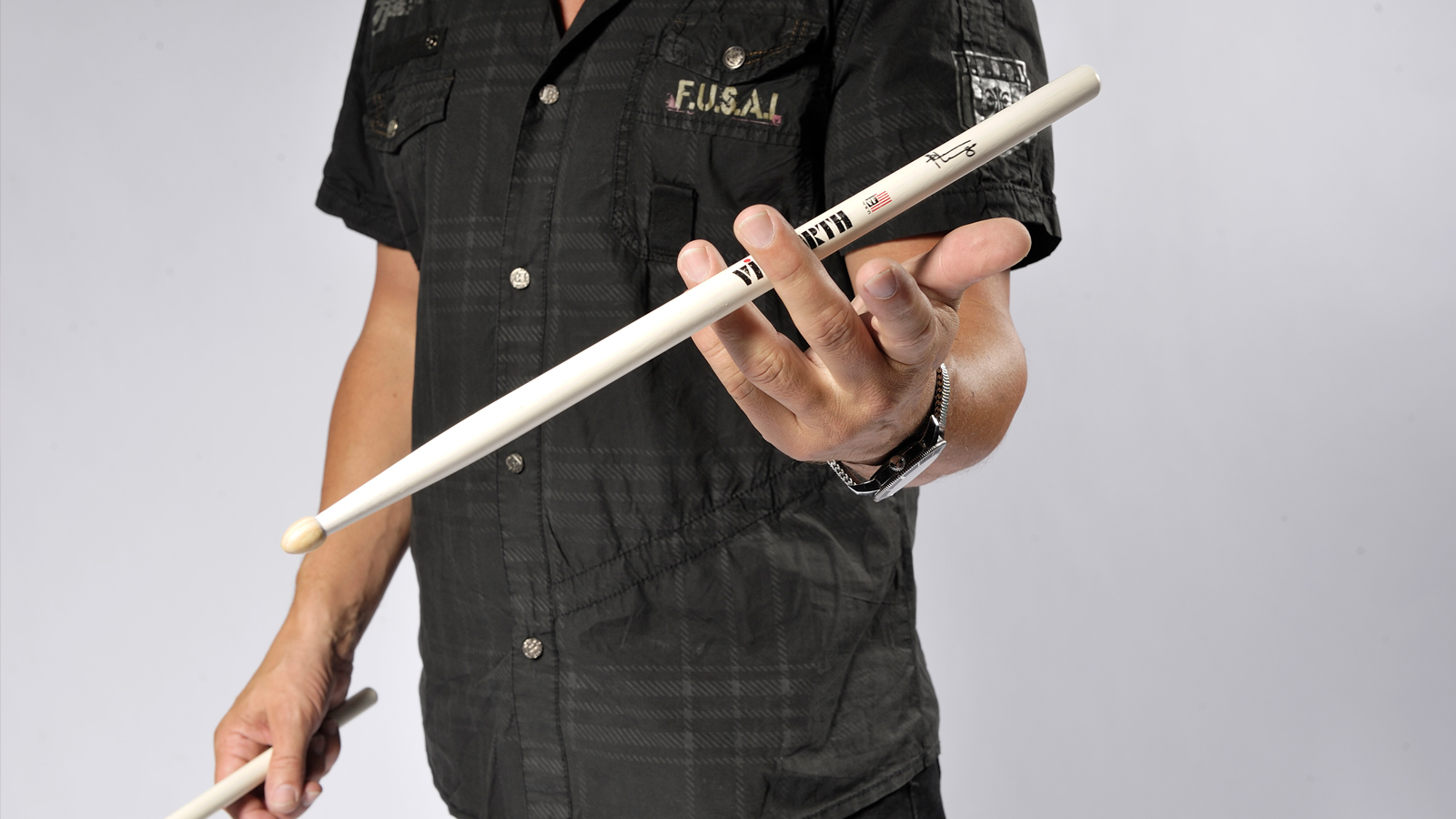
How to choose the best drumsticks for you
MusicRadar's got your back
Most often, wooden drumsticks are made from hickory. This medium weight hardwood is a hard-wearing material, while alternative woods such as oak and maple offer different weight and density options.
For even more durability it would be worth exploring sticks made from still-tougher materials such as aluminium or graphite. This added strength reduces the need to regularly replace drumsticks, but inevitably costs more on a one-off basis.
Cheaper budget drumsticks, commonly made from B-grade hickory, come in at a fraction of the price of premium sticks, and are well worth considering. Even if these aren’t your go-to A-grade stage model, it’s worth grabbing a few pairs of budget sticks as back-ups in case of mid gig or session breakages. These are often more than good enough for home practice or giving the kids a go on your kit, too.
So that’s the overview; now let’s run through key terminology to help inform your purchase of the best drumsticks for you. When searching for your next pair, you’ll see a number of key words used to describe features: thickness, length, taper and tip.
What does drumstick thickness and length relate to?
Thickness has an impact on the overall weight of the stick, and how it feels in your hand. This translates to playing comfort and the amount of power you can unleash on your drums and cymbals. Generally, thicker sticks are more durable, too. Length dictates the potential reach you have between your hands and your drums and cymbals and is measured from the butt of the stick to the tip.
What is drumstick taper?
The taper is the part of the stick that gets thinner as it heads towards the tip. Taper length impacts how the stick feels to play. Longer, thinner tapers promote faster, lighter playing, but these sticks tend to be more fragile.
What drumstick tip shapes are there?
Stick tips come in all shapes and sizes, in nylon and wooden guises. Each style extracts a different sound from your drums and cymbals. Ball tips tend to elicit more precise, articulate sounds, especially when it comes to cymbals. Acorn tips are fuller and warmer. For the best of both worlds, we’d recommend an oval tip. Nylon tips produce more attack than wood tips.
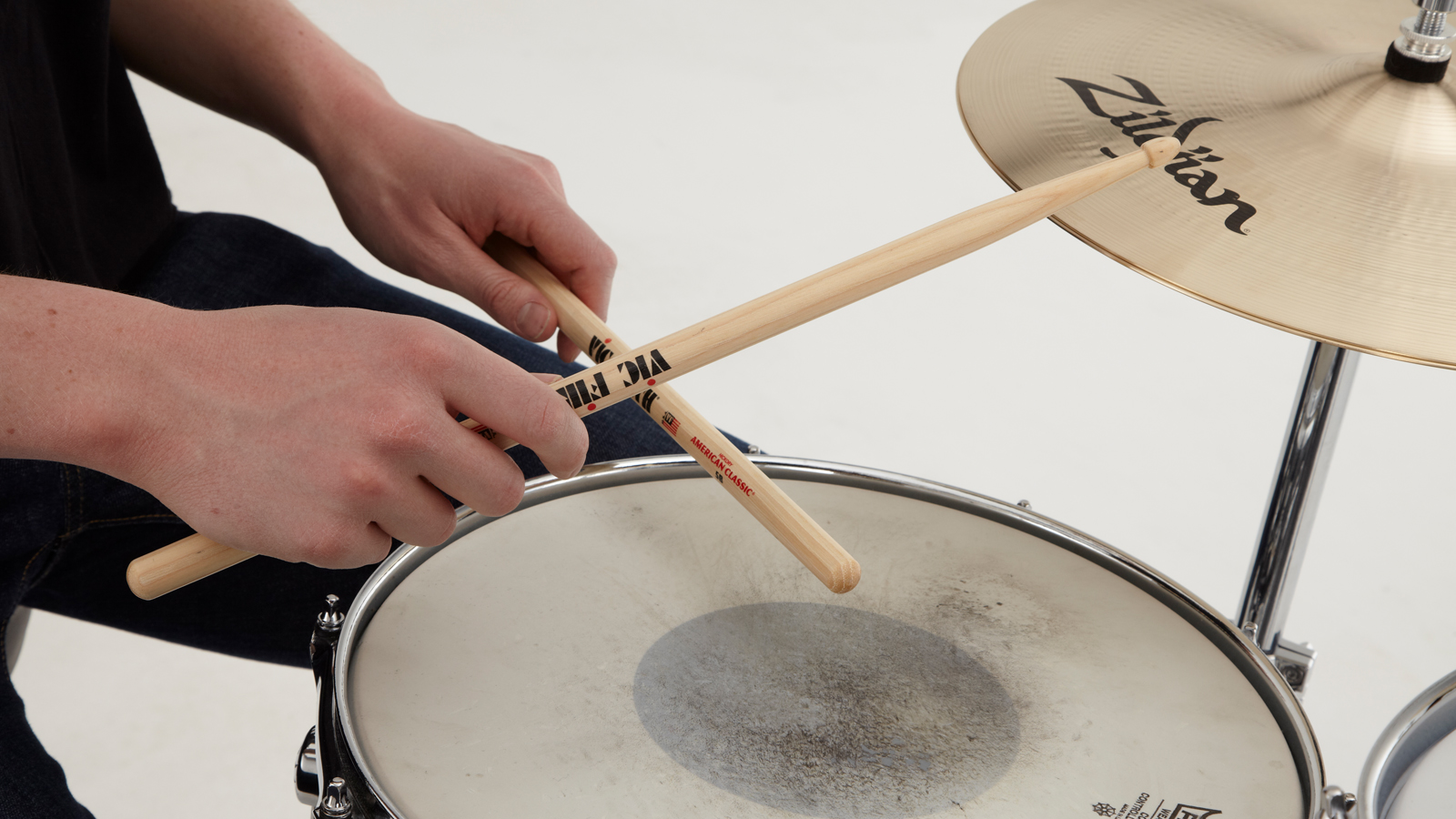
Should I try signature drumsticks?
Many stick companies use famous drummers to promote their products, often in the guise of signature drumsticks - that is, sticks designed to the exact specifications of the drummer in question, and usually with their name or band logo adorned on the stick. Many regular drummers swear by the signature model of their favourite drummer. But are signature sticks always the way to go? Yes and no…
You may well find that your favourite drummer’s signature stick is the perfect fit for you and your playing style, and they tick all the boxes for taper, thickness, length and tip. However, your favourite drummer may prefer to play an ultra thick, extra long model that is far too unwieldy for you. So, you need to be honest with yourself if you discover your hero’s stick isn’t for you.
Conclusion
For something as seemingly simple as buying a pair of drumsticks, there’s actually plenty to chew over. Our recommendation would be to pick up a few pairs of different sizes and start playing. You’ll soon home in on the right model for you.
How we choose the best drumsticks for this guide
Here at MusicRadar, we are experts in our field, with many years of playing, creating and product testing between us. We live and breathe everything music gear related, and we draw on this knowledge and experience of using products in live, recording and rehearsal scenarios when selecting the products for our guides.
When choosing what we believe to be the best drumsticks available right now, we combine our hands-on experience, user reviews and testimonies and engage in lengthy discussions with our editorial colleagues to reach a consensus about the top products in any given category.
First and foremost, we are musicians, and we want other players to find the right product for them. So we take into careful consideration everything from budget to feature set, ease of use and durability to come up with a list of what we can safely say are the best drumsticks on the market right now.
Find out more about how we test music gear and services at MusicRadar.
Related buyer's guides
- On a budget? Explore the best beginner drum sets around
- These are the best electronic drum sets for all budgets
- Sharpen your chops with the best drum practice pads
- Put your best foot forward with the best bass drum pedals
- Essential drum accessories every player needs
- Spoil them with the best gifts for drummers
Get the MusicRadar Newsletter
Want all the hottest music and gear news, reviews, deals, features and more, direct to your inbox? Sign up here.
I'm MusicRadar's eCommerce Editor. In addition to testing the latest music gear, with a particular focus on electronic drums, it's my job to manage the 300+ buyer's guides on MusicRadar and help musicians find the right gear for them at the best prices. I dabble with guitar, but my main instrument is the drums, which I have been playing for 24 years. I've been a part of the music gear industry for 20 years, including 7 years as Editor of the UK's best-selling drum magazine Rhythm, and 5 years as a freelance music writer, during which time I worked with the world's biggest instrument brands including Roland, Boss, Laney and Natal.
“Chinese Democracy was a boring record. But calling it Guns N' Roses was not honest. It was totally a solo record”: GN’R’s ex manager takes aim at Axl Rose
“Instead of labouring over a perfect recreation, we decided to make an expanded counterpart”: Chase Bliss teams up with Mike Piera for Analog Man collab based on the legendary King Of Tone
“It’s about delivering the most in-demand mods straight from the factory”: Fender hot-rods itself as the Player II Modified Series rolls out the upgrades – and it got IDLES to demo them